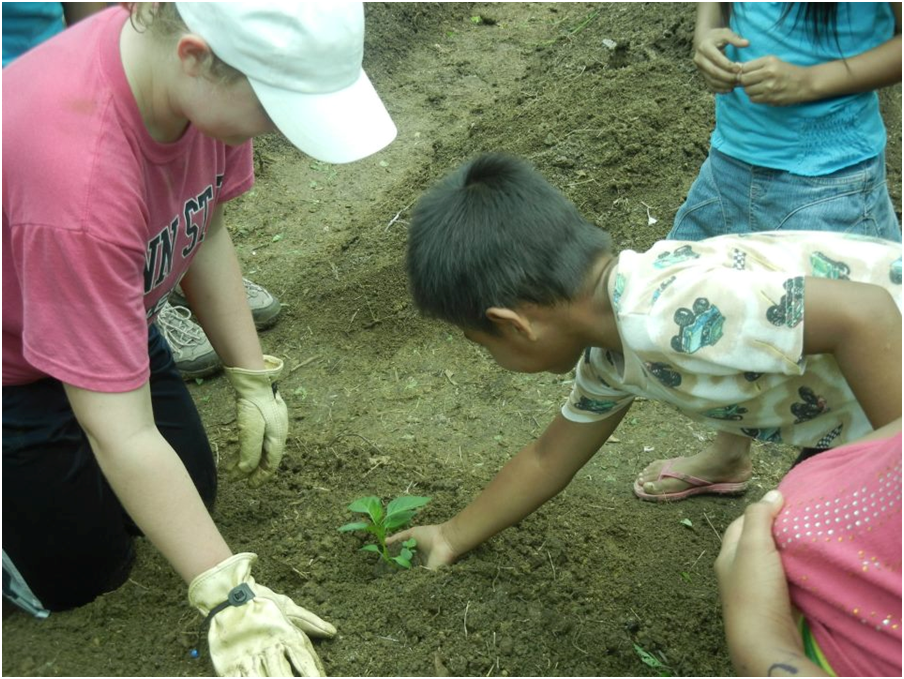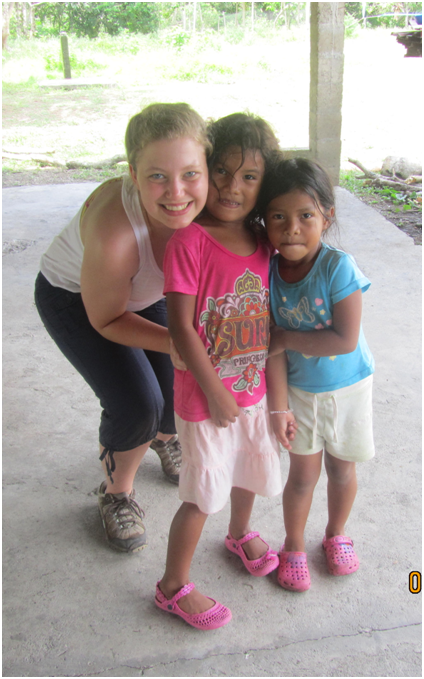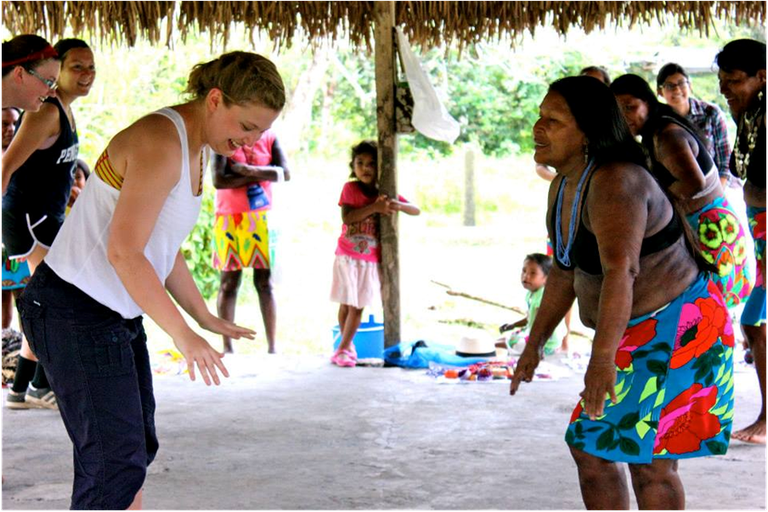Posted: September 5, 2013
Meeting people with a different perception on life instantly makes you question your own lifestyle.
Ever since I was a child, I had the "travel bug" and knew I wanted to see the world in its entirety. When I heard about Global Brigades, I was instantly intrigued because of my love to help people and the chance to see a different part of the world. Piriati Embera is located in the eastern part of Panama, approximately two hours from Panama City. To locals of Panama City, traveling to the indigenous community of Embera was unheard of and practically ridiculous. What was there to see in an area such as Embera? Why would you travel to a place with such a lack of commodities? As I traveled from Panama City to the Darien provenience, I instantly knew why I wanted to do such a "ridiculous" thing.
I should back-track a little….to the very first day of travel. Two thirty A.M. rolled around, and after not sleeping at all and being up for already twenty hours, we were on our way to Newark airport. Our flight was supposed to leave at 5:10 A.M. and land in Houston, Texas. All eighteen global environmental brigaders successfully made it through security and we were practically sprinting to catch our flight in time. Thankfully we did and we took off in time. Not even a half hour later, though, we were back on the ground at the same airport we had left from. "A discrepancy in the fuel gage" caused us to land and our flight was delayed. Thankfully, Arianna and Andrea, our GEB project advisors, had seen that our flight had been delayed, realized that we were going to miss our connecting flight from Houston to Panama City and booked us another flight. Unfortunately, it was several hours later and we would not be getting into the city until much later, missing our chance to site see and visit the canal. As an experienced traveler, I realized that these things happen and was just happy when we finally landed in Panama City safe and sound and could get a good nights sleep (it had now been almost 48 hours awake).
 Our first day was primarily to just relax, visit the community, meet the members and enjoy the sites of Panama. Thankfully, there was no "hard labor" that day or I might have fallen asleep digging a hole. After a two hour drive from Pro Ninos, the compound we had been staying in, we made it to Piriati Embera, approximately twenty minutes outside of the more heavily populated town Torti. Instantly, I felt the culture shock. This had been the first time I had been in a "third-world country" per say (although I hate that term) so I was not used to the random farm animals running around, people not wearing shoes and the all-together lack of comforts and commodities. As soon as these thoughts crossed my mind though, the next thought was, "They are happy. Probably happier than most Americans living in mansions." We had a proper welcoming and a cultural background "charla" (translated to 'chat'). My favorite part of this day was getting the chance to have a one-on-one talk with a mother in the community. She talked about her seven children (yes, seven- and that was not even a lot!), her religion and her everyday activities. Everybody says life is different in countries such as Panama, but I was not quite prepared for how much different it was. She explained her primary income was the farming her husband did, mainly coffee and plantains, and the artisan items she had made, all strictly from products created by nature. With a bit of sadness, she explained that she was unable to make a lot of products these days because the government had been cutting down the trees she primarily used for carving and weaving baskets. This definitely hit me hard. We came into this community to help with the deforestation. Although I knew I was helping this community, it was not clear to me how important it was until this moment. These people needed these crops to thrive as a community and without these, the community, as a whole, could lose a lot of profit they need to survive. Through the 100 degree weather, sweat and hard labor, this was my motivation and inspiration.
Our first day was primarily to just relax, visit the community, meet the members and enjoy the sites of Panama. Thankfully, there was no "hard labor" that day or I might have fallen asleep digging a hole. After a two hour drive from Pro Ninos, the compound we had been staying in, we made it to Piriati Embera, approximately twenty minutes outside of the more heavily populated town Torti. Instantly, I felt the culture shock. This had been the first time I had been in a "third-world country" per say (although I hate that term) so I was not used to the random farm animals running around, people not wearing shoes and the all-together lack of comforts and commodities. As soon as these thoughts crossed my mind though, the next thought was, "They are happy. Probably happier than most Americans living in mansions." We had a proper welcoming and a cultural background "charla" (translated to 'chat'). My favorite part of this day was getting the chance to have a one-on-one talk with a mother in the community. She talked about her seven children (yes, seven- and that was not even a lot!), her religion and her everyday activities. Everybody says life is different in countries such as Panama, but I was not quite prepared for how much different it was. She explained her primary income was the farming her husband did, mainly coffee and plantains, and the artisan items she had made, all strictly from products created by nature. With a bit of sadness, she explained that she was unable to make a lot of products these days because the government had been cutting down the trees she primarily used for carving and weaving baskets. This definitely hit me hard. We came into this community to help with the deforestation. Although I knew I was helping this community, it was not clear to me how important it was until this moment. These people needed these crops to thrive as a community and without these, the community, as a whole, could lose a lot of profit they need to survive. Through the 100 degree weather, sweat and hard labor, this was my motivation and inspiration.
For two days following, we worked in this community, side-by-side with the women, planting plantains, coffee and rosewood trees, all of which are extremely important to the Embera community. It is important to note that GB does not come into a community that does not want them there in the first place. Secondly, GB works in cooperation with the designated community to know exactly what they want and need. Through development models, also implemented by GB, they know what works and doesn't work and will not continue to implement projects that have failed in the past. The reforestation project has just recently been started in different Embera communities. The basis of the project is to have a short, medium and long-term goal so that the members of the community do not abandon the project in future years, but take care of it. Over the two days that we worked with Piriati Embera, we planted almost 400 different crops, taught them about composting and proper waste management techniques. These charlas we did with them was so important to me because my passion is in waste management and soil studies, so being able to communicate the importance of these topics to people who do not have an educational background in this field was incredible. The highlight for me was when one of the women asked how long it took for a mango peel to decompose and we responded, "Approximately a week or two." She shrugged and asked "How long does it take for a plastic bottle to decompose?" When we responded with, "50,000 years," she looked absolutely mind-blown. Making a positive impact, even if it is a small one, is enough for me to be excited. If one person changes their destructive ways to something healthier and sustainable, I have made a small difference.
 One day we experienced working with another community, Embera Peru, another Embera indigenous community that had been thriving due to the implementations of GB public heath, environmental and medical. Here, we planted more plantain trees and also did some greenhouse upkeep. The community was very receptive to us, due to multiple interactions between other brigades, so the children were open to our presence. We played many games and even ate lunch with the children. Although this community was far from "westernized," they were extremely open to the idea of westerners working with them for a more sustainable lifestyle.
One day we experienced working with another community, Embera Peru, another Embera indigenous community that had been thriving due to the implementations of GB public heath, environmental and medical. Here, we planted more plantain trees and also did some greenhouse upkeep. The community was very receptive to us, due to multiple interactions between other brigades, so the children were open to our presence. We played many games and even ate lunch with the children. Although this community was far from "westernized," they were extremely open to the idea of westerners working with them for a more sustainable lifestyle.
The last day in Panama was definitely a play-day for all of us. We were allowed to play games, such as "duck, duck, goose," Frisbee and futbol in Piriati Embera. There was some cultural dances, singing and an Artisan sale of the different items the women had crafted (I even got a tattoo….fake!).
There are not many things in life people say are truly life-changing, but traveling to Panama with Global Environmental Brigades was one for me. There is so much fear instilled in people today about the perceptions of a third world country or a even a country with a language barrier. Yes, I will admit, while I was at the travel clinic getting all my shots I was thinking, "What the heck am I getting myself into?!" I know now. Clarity. Perspective. Simplicity. Adventure. Freedom. Meeting people with a different perception on life instantly makes you question your own lifestyle. Do we need electricity to be happy? Do we need multiple cars do to be happy? Do we need a big house to be happy? All the answers are no. We need an open-mind to accept what others can offer us, a big heart to love Mother Earth and all life forms on her and a smile because even though there are language barriers, a smile is one thing that is universal.
Ag Sciences Global
Address
106 Agricultural Administration BuildingUniversity Park, PA 16802
- Email globalag@psu.edu
- Office 814-863-0249
- Fax 814-865-3055
Ag Sciences Global
Address
106 Agricultural Administration BuildingUniversity Park, PA 16802
- Email globalag@psu.edu
- Office 814-863-0249
- Fax 814-865-3055


